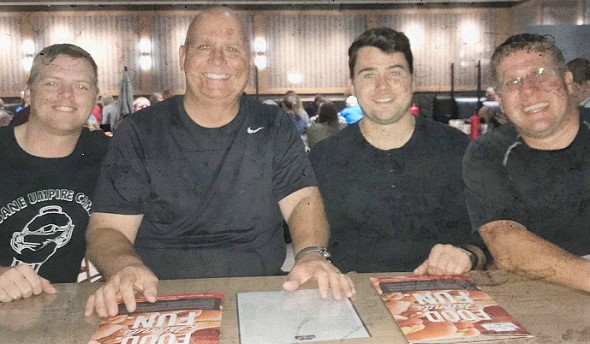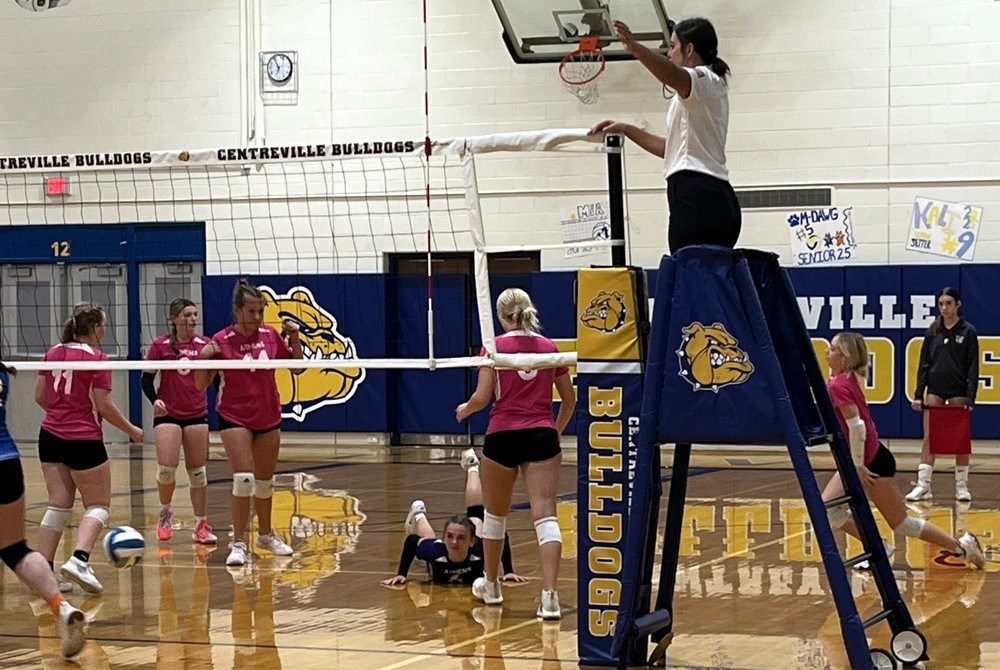
The Official View: Night with the Crew
By
Brent Rice
MHSAA Assistant Director
October 1, 2018
By Brent Rice
MHSAA Assistant Director
In this week’s edition we discuss the power of our words and delivering them proactively, examine a football rule regarding rushing the punter and take a look at an “It’s Your Call” at the volleyball net.
It’s Official!
The Words We Use: Officials face criticisms regularly for their rule enforcement, judgment decisions and even positioning. As we know, these criticisms will be tossed about whether you get plays and rulings correct or not, so there is very little we can control in this area. One area we can control the criticisms we receive is the way we speak to others.
I’ve heard people say, “I’ll give them respect when they earn it.” If that’s your line of thinking, maybe you should consider giving respect simply because it’s the right thing to do. The way you communicate as an official to coaches, players and administrators reflects on you professionally, and often is a determining factor on how these parties view you in carrying out the rest of your responsibilities. If they think you’re a bad person, they often don’t give you the benefit of the doubt in close-call situations.
There are a number of books written on the art of diffusing situations through the words you use. One that immediately comes to mind is “Verbal Judo” by George Thompson. It is rather succinct and definitely worth the read. It provides much more detail on the philosophy of word usage, but let me provide you with a couple of seemingly innocuous phrases that can draw the ire of a coach and should be avoided:
“Well, that’s the rule” – Rules citation is very important when providing explanations, but simply stating that the rule says so sounds flippant and is looked at as a cop-out. Instead, start with “By rule,” then use rulebook terminology to describe the situation and ruling.
“Calm down” – While this is much better than the cringe worthy “Shut up” or “Hush” we hear being used from time to time, it still can provoke a primal urge to respond and can actually have the opposite effect of what is intended. Instead, try getting the results you desire by having them talk it through. Try statements like “All right, I’m listening to you,” or “Okay, explain to me what you’re asking.” And when using a phrase like “calm down,” trying adding an “if” statement along with it. For instance, “I’ll explain to you what I have if you calm down.”
Rule of the Week
FOOTBALL Team R loads up the box with rushers to put pressure on K’s punt deep in its own zone. As K1 punts, R1, coming from the center of the line, just gets fingers on the ball and partially blocks it. R2, from the edge, then firmly contacts the kicker’s plant leg and sends him to the ground.
Ruling: This is not a foul (in itself). The rulebook does not provide that only the player who touches the kick is excused from contacting the kicker. This exception to the rule refers only to when “the defense touches the kick.” (9-4-5-b) Of course, this does not give carte blanche to defensive players to go out of their way to unnecessarily rough the kicker just because the ball is touched.
It’s Your Call
VOLLEYBALL The clip from this week picks up after an extended volley. As Team S plays the ball over the net for its third hit, a front row member of Team R makes a play on the ball. The questions is, are the two contacts by the front row R player legal? Why or why not?
Last Week’s IYC Ruling: The basic spot on the play is the end of the run. Using the all-but-one principle, this foul would be penalized from the spot of the foul (A’s 35). If the defense accepts the penalty, it would be A’s ball, 3rd-and-27 on A’s 20. If the defense declines, it would be 4th-and-8 on A’s 39. This is definitely an instance that you want to run the options by B’s coach before enforcing the penalty. (Click to see the video from last week.)
Official View
After a long, hard-fought Friday night contest between Rockford and Greenville, crew members (left to right) Dale Feutz, Brian Donovan, Sam Boland, and Luke Griemsman stop in at a local Rockford eatery to discuss the night’s game over a meal.

Southwest 10 Conference Welcoming Volleyball Athletes as Legacy Officials
By
Steve Vedder
Special for MHSAA.com
November 13, 2024
Instead of just hitting a volleyball, Gracie Smith now finds herself enjoying the larger picture.
The Decatur senior has spent the last six years playing volleyball at different levels. But thanks to an innovative new program undertaken by the Southwest 10 Conference, Smith now sees the sport through an entirely new light.
She's one of 13 varsity volleyball players at three schools who've added another paragraph to their resume: officiating.
The players have become MHSAA-registered officials cleared to work Southwest 10 Conference middle school and freshman matches as part of the MHSAA Legacy Program. Smith said the program has contributed much to her love of the game by helping her better understand the officials during her own varsity matches and providing her opportunities to give back to the community and help out a sport in dire need of new officials – in addition to adding a bit of spending money to her budget.
"I am excited about trying this," Smith said. "I can make some extra cash, be at the same level of officials who do our games and take what I've learned on the court and put that knowledge to use.
"I definitely think I'll do this again next year. I can earn a few extra bucks, and I can give something back to the game"
Eric Frohriep, president of the All-Star Officials Association and assigner of officials to Southwest 10 matches, said the project was borne out of a necessity to attract new officials to the sport.
He sent inquires to conference schools looking for high school-aged players willing to undergo officials training that included viewing a video and power point zoom presentation on YouTube. Twenty-three players wound up attending a clinic this past summer, and 13 from Centreville, Decatur and White Pigeon took the next step by registering as officials. They were eligible to work mostly middle school games this fall.
Frohriep hopes the numbers will grow but is more than content with the program's initial steps. He said volleyball is in critical need of attracting new officials to replace those retiring or moving on. He estimates the average age of volleyball officials to be about 60, and the existing cadre of officials is being spread too thin, including a dwindling number of Southwest 10 Conference officials willing to work several nights a week plus weekend tournaments.
"We absolutely have to," he said of attracting new officials. "For those who retire, we're not replacing them fast enough. We've got to lure new officials to maintain the amount of officials we need."
If the new recruits' reactions are any indication, the program is off to a solid start. Decatur senior setter Sienna Potter said it beats other teenage money-making endeavors from babysitting to working at the mall, plus keeps athletes around a sport they love.
"It was fun," said Potter, who worked a handful of both middle school and freshman matches this fall. "I definitely think officiating can be in my future. There's a big need for referees, and I think this was a good idea. I like the money, but I think it also builds my skill in talking to officials at our games. I liked it a lot. It's something interesting, and the money helps out."
Decatur senior Abby Baushke, who has played volleyball competitively for eight years, worked four middle school matches this fall. The experience left her with a more insightful view of the officials she sees at her own varsity matches.
"Plus it helps me give back to the community and helps players understand the sport better," said Baushke, a Wayne State volleyball commit. "I think (officiating) is easier for us because we've played the game. I've learned that it's hard to make quick calls because the game goes so fast. I've played club for four years, and this definitely can be useful to me besides making money."
White Pigeon athletic director Brooke McClure, a former volleyball official, said the program was successful enough that the Southwest 10 elected to start similar programs in basketball and wrestling this winter. Baseball, track, softball and soccer will follow in the spring.
"It's definitely win-win," she said. "There is a shortage of referees and I think, No. 1, these girls are thinking about the game they love and can see the value in that. They're going to learn what it's like to spend a day in officials' shoes. If we can get more girls involved, then this is our contribution to that."
White Pigeon junior Mercede McDaniel, who has played the sport since fourth grade, admits there was a bit of trepidation as she eased into the program, but that was quickly replaced with the confidence of being a registered official.
"It's a nice way to see volleyball," she said. "I was a little nervous at first in trying this, but I love the game. I definitely liked it."
PHOTO Centreville’s Mary Stears stands adjacent and above the net as she officiates a match this fall. (Photo courtesy of the Centreville athletic department.)

